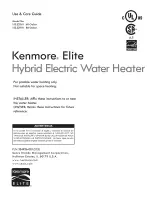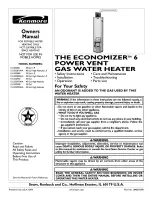
INTRODUCTION
The Clearstream System is one of the finest aerobic wastewater systems available today.
Our system converts the sewage from your residence or business into a clear, odorless liquid. This
high degree of treatment is accomplished at a remarkable low operating cost per month. The
system has been simplified over the years to make it as inexpensive to operate and as low in
long term maintenance as possible. Homeowners who have lived with the nuisance of a septic odor
lingering in their neighborhood will truly appreciate the pleasure of owning a Clearstream System.
Clearstream Model DA Systems comply with NSF Standards 40 for Class I residential wastewater
treatment systems, 245 for total nitrogen reduction and 350 for onsite residential and commercial
water reuse treatment.
PROCESS DESCRIPTION
There are four basic zones or compartments to this treatment unit. Wastewater enters the
aeration chamber of the process tank, where it is mixed with organisms formed during decomposition
of organic material in the wastewater, mixing in the chamber is achieved by release of compressed air
near the bottom of the chamber through fine bubble diffusion.
A conical shaped clarifier is located internal to the process tank to provide for separation of the
solids from the mixed liquor. The mixed liquor passes into the bottom of the clarifier by hydraulic
displacement as wastewater enters the aeration chamber. Solids settled from the wastewater are drawn
back into the aeration chamber from the bottom of the cone by the hydraulic roll created by the air
released in the aeration chamber and are dispersed by the mixing induced by the aerator. An airlift
assembly controlled by a timer and solenoid switch borrow air from the aerator to divert a
small
return of water from the clarifier back to the pretreatment tank. Approximately 7 hours of return is
needed for treatment system max flow to provide de-nitrification. Discharge of the final clarified
effluent occurs through a submerged tee assembly located below the clarifier surface to prevent
discharge of solids that may float on the surface of the clarifier.
When
disinfection is required before final discharge
,
appropriate disinfection options are
available.
If used in Std. 350 operation
the
Clearstream Model
CS
UV1
unit must be installed on
discharge.
When properly loaded and maintained, the aforementioned process allows the Clearstream
Wastewater Treatment System to provide years of satisfactory service for the consumer. Clearstream
Model DA systems m
e
et the performance requirements of NSF Standard
s 40, 245 and 350.
Actual
GCT test results used to determine
Clearstream
's certifications
met Standard 2
4
5 averaged <10
mg/l BOD, <10 mg/l TSS and >50% total nitrogen reduction
.
2 of 1
2






























